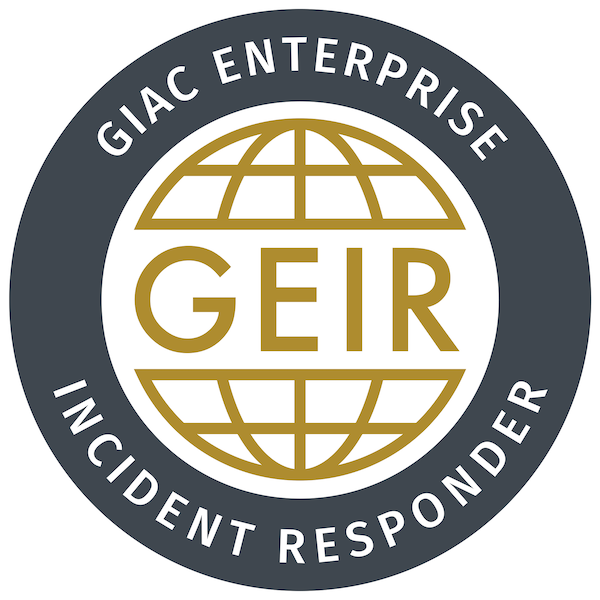Areas Covered
- Incident Response Team Management and Coordination
- Enterprise Incident Detection and Threat Hunting
- Large Scale Event Correlation and Timeline Analysis
- Multi-platform Artifact Analysis
- Analysis of Windows Artifacts
- Analysis of Linux Artifacts
- Analysis of macOS Artifacts
- Analysis of Container Artifacts
- Analysis of Cloud Environment Artifacts
Who is GEIR for?
- Incident Response Team Leads and Advanced Practitioners
- Threat Hunting Professionals
- Experienced Digital Forensic Analysts
- Enterprise Detection Engineers
- Federal Agents and Law Enforcement Professionals
- SANS DFIR Alumni looking to apply their forensic skills at scale.
GEIR with CyberLive
GIAC knows that cyber security professionals need:
- Discipline-specific certifications
- Practical testing that validates their knowledge and hands-on skills
In response to this industry-wide need, GIAC developed CyberLive - hands-on, real-world practical testing.
CyberLive testing creates a lab environment where cyber practitioners prove their knowledge, understanding, and skill using:
- Actual programs
- Actual code
- Virtual machines
Candidates are asked practical questions that require performance of real-world-like tasks that mimic specialized job roles.
Exam Format
- 1 proctored exam
- 82 questions
- 3 hours
- Minimum passing score of 72%
Delivery
NOTE: All GIAC Certification exams are web-based and required to be proctored. There are two proctoring options: remote proctoring through ProctorU, and onsite proctoring through PearsonVUE. Click here for more information.
GIAC certification attempts will be activated in your GIAC account after your application has been approved and according to the terms of your purchase. Details on delivery will be provided along with your registration confirmation upon payment. You will receive an email notification when your certification attempt has been activated in your account. You will have 120 days from the date of activation to complete your certification attempt.
Exam Certification Objectives & Outcome Statements
- Cloud Response and Analysis The candidate will demonstrate a familiarity with popular cloud attack scenarios and display an understanding of common manual and automated techniques for identifying, extracting, and analyzing artifacts when responding to a cloud-based incident.
- Container DFIR Fundamentals The candidate will demonstrate a basic understanding of container technology, a familiarity with common attack techniques performed against containers, and a foundational digital forensic and incident response strategy when responding to a container-based incident.
- Detecting Modern Attacks The candidate will demonstrate an understanding of how to apply threat intelligence and information gathered through proactive threat hunting to support the detection and response to modern attacks.
- Enterprise Incident Response Management The candidate will demonstrate an understanding of how to manage and conduct effective incident response within an enterprise environment and will display a familiarity with techniques used to address common operational challenges while performing large scale investigations.
- Enterprise Visibility and Incident Scoping The candidate will demonstrate a familiarity with common data source types in an enterprise environment and will display an understanding of strategies to aggregate telemetry from a large volume of disparate resources in order to scope an incident.
- Foundational Cloud Concepts The candidate will demonstrate an understanding of fundamental cloud concepts and a familiarity with the most common cloud services that enterprises use to support business operations.
- Linux DFIR Fundamentals The candidate will demonstrate an understanding of digital forensics and incident response fundamentals for a Linux system, including foundational knowledge of the file system, locations and format of important logs, and key configuration files.
- Linux Essentials The candidate will demonstrate a basic understanding of a Linux operating system, common challenges when securing and monitoring Linux systems, and popular platform-specific attack techniques across an attack lifecycle.
- macOS DFIR Fundamentals The candidate will demonstrate an understanding of digital forensics and incident response fundamentals for a macOS system, including foundational knowledge of the file system, locations and format of important logs, and key configuration files.
- macOS Essentials The candidate will demonstrate a basic understanding of a macOS operating system, common challenges when securing and monitoring macOS systems, and popular platform-specific attack techniques across an attack lifecycle.
- Rapid Response Triage at Scale The candidate will demonstrate an understanding of how to efficiently collect, process, and analyze incident response triage data across a large volume of endpoints.
Other Resources
- Training is available in a variety of modalities including live training and OnDemand.
- Practical work experience can help ensure that you have mastered the skills necessary for certification.
- College level courses or self paced study through another program or materials may meet the needs for mastery.
- Get information about the procedure to contest exam results.
Practice Tests
- These tests are a simulation of the real exam allowing you to become familiar with the test engine and style of questions.
- Practice exams are a gauge to determine if your preparation methods are sufficient.
- The practice bank questions are limited so you may encounter the same question on practice tests when multiple practice tests are purchased.
- Practice exams never include actual exam questions.
- Purchase a GEIR practice test here.
- GIAC recommends leveraging additional study methods for test preparation.




